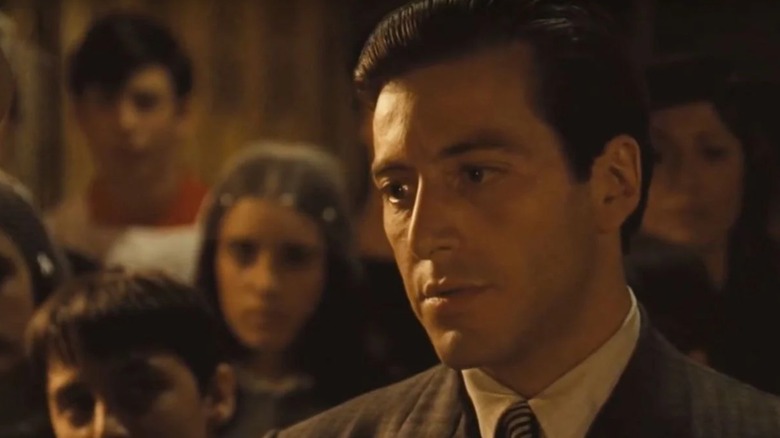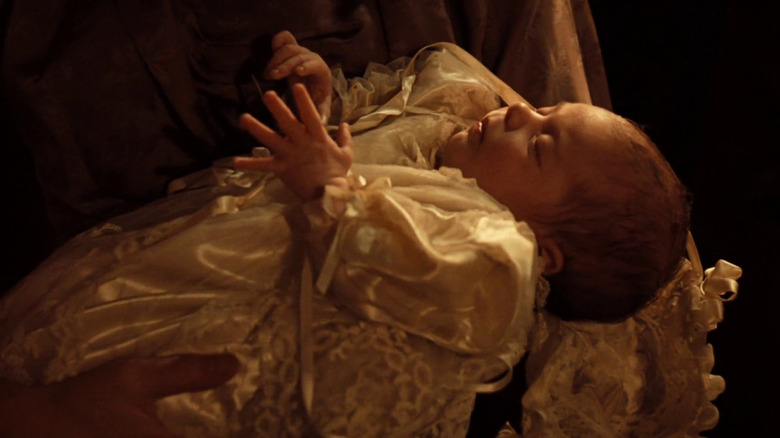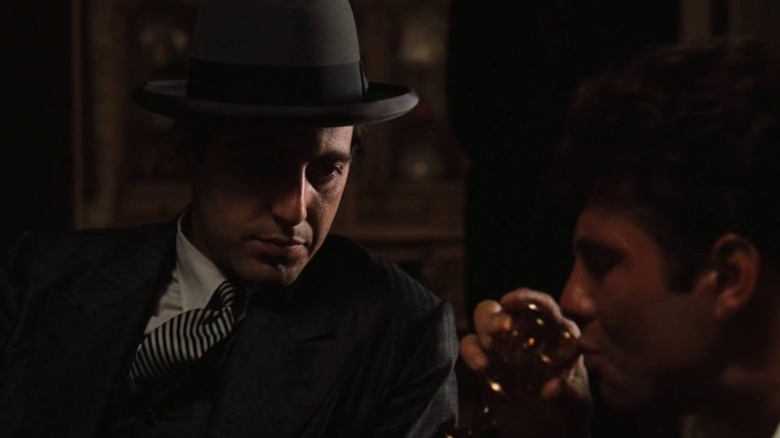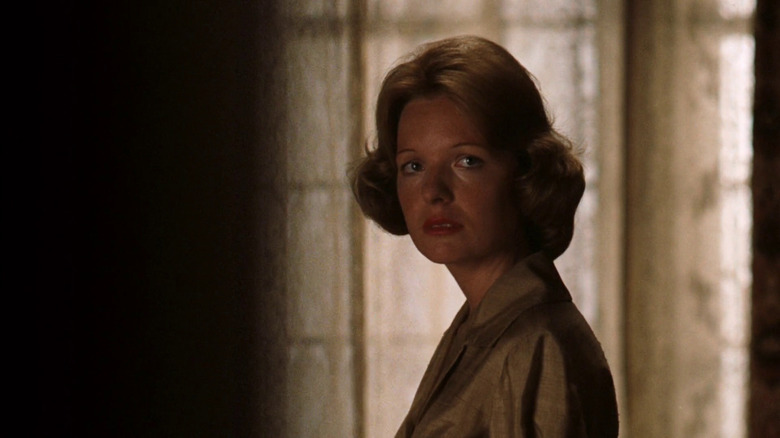The Godfather Ending Explained: Baptism By Blood
In the final moments of Francis Ford Coppola's seminal classic "The Godfather," the audience bears witness to one of the most stunning onscreen transformations of a character in Al Pacino's Michael Corleone. It's the consummation of his shift from the virtuous and patriotic war hero he is at the beginning of the movie, to the malevolent and intimidating figure he becomes by its end. Portrayed by Al Pacino in only his third acting role, Coppola's adaption of Mario Puzo's novel elegantly and brutally illustrates Michael's tainted rebirth as Don of the Corleone crime family.
Under the bleak and gaudy strokes of Coppola and Puzo's design, the audience watches Michael's christening as godfather of his sister's child occur in tandem with the brutal murders he orchestrated. In those last diabolical minutes, "The Godfather" leaves a lasting impression with its severe visuals, with Pacino driving home the grave consequences of his character's victory.
The Baptism Scene Unveils Michael's Ruthlessness
As Michael becomes godfather to Connie's child, his execution orders are carried out against the various enemies and betrayers of the Corleone family. The leaders of the other families, Moe Greene, the traitor Tessio — even his sister's husband Carlo — all are eliminated as threats to Michael's vision of the future. Over the course of 67 shots that cut back-and-forth over roughly five minutes, the baptism montage is one of the more famous scenes in "The Godfather." As a foreboding organ track plays over the shots, Coppola illustrates Michael's desire to separate his vicious role as Don with his family and public life with the quick cuts. But it also exposes just how little the deaths weigh on Michael's mind, even as he stands inside a church at the baptism of his godchild, renouncing sin, and proclaiming his belief in a morality he doesn't abide by. To him, the deaths are necessary for securing the future of the Corleone family, revealing the narcissistic ambition that's begun to float to the surface of Michael's personality and its dangerously indefinite limits.
In Decieving Carlo, Michael Foreshadows His Own Family isn't Safe
The finale of "The Godfather" escalates Michael's transformation further with the killing of Carlo over his role in the death of Sonny, the eldest Corleone brother and original heir to the title of Don. In a terribly brilliant deception, Michael shares with Carlo that he's settled "all family business," AKA he's murdered everyone who could possibly be a threat and it's in Carlo's best interest to 'fess up. Like his father Vito, Michael knows not only when to exert brute force but also when to use tact, coming to Carlo like the Devil himself — calm and suave. He even wields his new status as godfather to Carlo's son as a reason to trust him, offering him exile as punishment if he confesses. When he does, he has him strangled in a violent scene that sees Carlo kicking the window out in a vain struggle to escape.
If Michael's cold-blooded mass execution of the family's enemies wasn't enough to get across his metamorphizes into a callous, wartime Don, the murder of Carlo is the resounding finale of his violent crescendo. Although Carlo was responsible for Sonny's death, it's the fact that Michael thoughtlessly turns his own sister into a widow and is now himself responsible for the death of his godchild's father that pushes him past the point of no return. Connie says as much when she confronts Michael, alternating between her uncontrollable grief and inability to comprehend that her brother could be capable of such brutality. Michael's decision to kill Carlo is a chilling precursor of his future descent into further ruthlessness, foreshadowing even his family could find itself in the crosshairs of his wrath.
Michael's Cold Shutting Out of Kay Completes His Transformation
When Michael's capos remove Connie from his office he's left alone with Kay, he's forced to reckon with the one person he must be fully honest with — but instead, he lies straight to her face. After she has the courage to ask if he really did kill Carlo, Michael explodes in anger telling her that she cannot ask about his business. But his anger is only another deception and he utilizes it to feign the burden of pulling back the curtain on his organization for the peace of mind of his wife. "Just this once," Michael tells Kay, manipulating her desperation to close the growing distance between them, as well as assuaging her fears that he's not a heartless murderer. Her relief when he gives her an effortless "no" is not felt by the audience and in many ways, this is Michael's final and cruelest act in becoming Don: the betrayal of Kay's trust and her love.
But it's the film's final shot that's quintessential of the entire exchange, one that ends with Kay looking on at her husband from across their home before the door to his office is closed by his men, shutting her out. There is a harsh finality to the scene that, like the baptism one that precedes it, pairs Michael's hard-won victory with a change in how he both interacts and views his own family. As Don, he's secured their safety by destroying their enemies, but by the end of "The Godfather" that cost appears to be Michael's very heart and soul, and its conclusion grandly sets up Coppola's second act of the story in "The Godfather: Part II."



